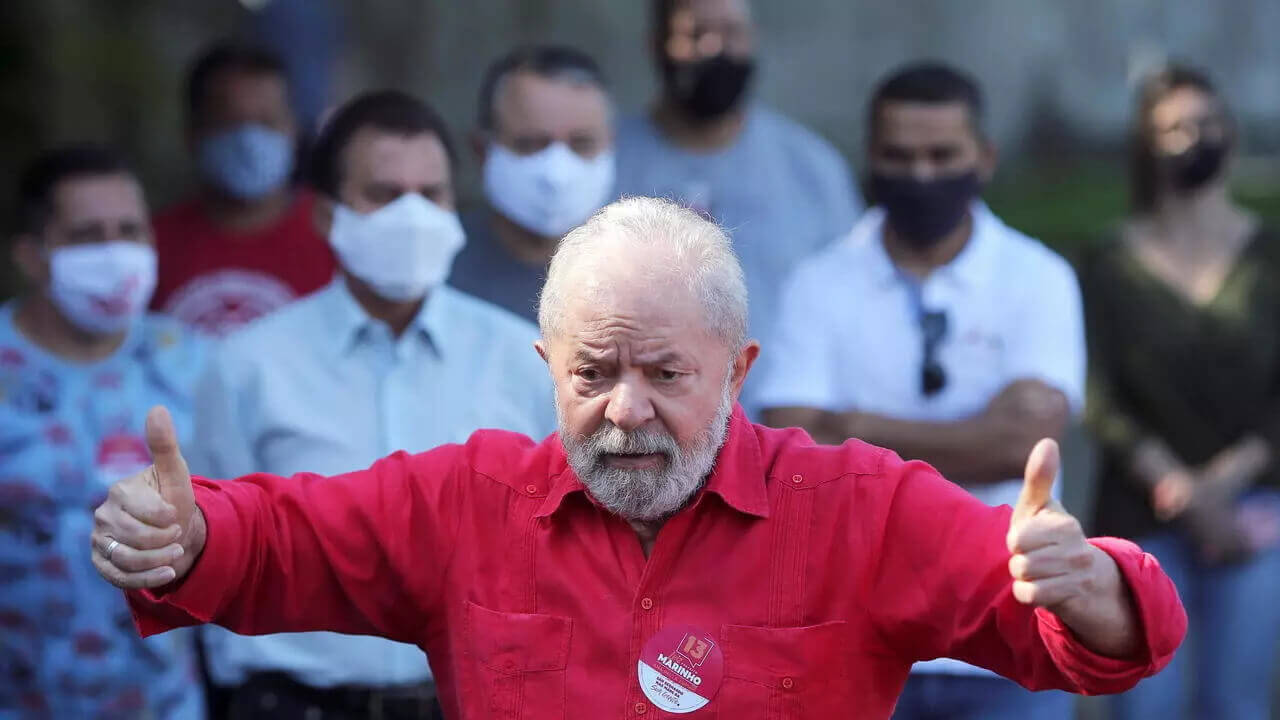On Wednesday, Supreme Court Justice Luiz Edson Fachin in Brazil cleared former President Luiz Inácio Lula da Silva of all corruption charges, paving the way for him to run against incumbent Jair Bolsonaro in 2022, after his candidacy was rejected for the 2018 election.
Lula, who served as president from 2003 to 2010 and was appointed as Chief of Staff by former President Dilma Rousseff, who ruled from 2011 to 2016. He was arrested for acting as the ‘ringleader’ in the Petrobras scandal during Rousseff’s term and both of them were implicated in a multi-billion dollar corruption and money-laundering scandal with state-run energy company Petrobras. He was also found guilty of accepting a $1 million bribe from construction company OAS in exchange for a lucrative public contract. This formed part of “Operation Car Wash”, the country’s biggest-ever corruption investigation, which brought to heel several political and business leaders. Lula was convicted in 2017 and jailed in 2018 for a 12-year sentence, although he was released in late 2019.
This week, however, Justice Fachin annulled the four corruption cases against Lula, arguing that that the cases were “tried in the wrong jurisdiction” and that the former leader must be retried in federal courts. This means that Lula has been cleared to re-enter the political arena. However, there still exists the possibility that Lula can be convicted again before the October 2022 election, in which case his candidacy would once again be revoked. At the same time, the Supreme Court could uphold an appeal by the prosecutor-general’s office, which would reverse Justice Fachin’s verdict. However, it has been suggested that the statute of limitations for prosecution may have expired.
The left-wing politician remains a highly popular figure in Brazil, and left office with an approval rating that was above 80%. Although his popularity has somewhat receded in light of the many corruption scandals he is associated with, Bolsonaro’s failure to handle the coronavirus crisis could provide an opening for Lula.
In fact, the task force in charge of Operation Car Wash came under fire for appearing to be partisan, after it emerged that investigators had ‘conspired’ to prevent Lula from running in the 2018 presidential race, which Bolsonaro eventually won. Early polls indicated that Lula would have won that election.
A survey conducted by Ipec that was published in the newspaper O Estado de S.Paulo last week revealed that 50% of the 2,002 interviewed would “certainly” or “could” vote for Lula, compared to just 38% for Bolsonaro. 44% said they would “never” vote for Lula, while 56% said they would “never” vote for Bolsonaro.
Bolsonaro, for his part, has denounced the decision of the Supreme Court Justice, saying that it came as ‘no surprise’ to him because the “Fachin has always had a strong connection with the PT” (Lula’s party). Describing Lula’s governance as “catastrophic”, Bolsonaro went on to say, “I think the Brazilian people don't even want a candidate like that in 2022, much less think about his possible election.”
Lula has previously accused Bolsonaro of “leading Brazilians to the slaughterhouse” through his “grotesque” and “reckless” response to the coronavirus crisis. In an interview with The Guardian last year, he opined, “You can be certain the left will be governing Brazil again after 2022,” adding, “We will vote for someone who is committed to human rights and respects them, who respects environmental protection, who respects the Amazon … who respects blacks and the indigenous. We’re going to elect someone who is committed to the poor of this country.”
Brazil’s death toll from the coronavirus is over 266,000 and continues to rise at a blistering pace. Last week, after the country registered a record number of new cases and deaths, Bolsonaro said, “Enough fussing and whining. How much longer will the crying go on. How much longer will you stay at home and close everything? No one can stand it anymore. We regret the deaths, again, but we need a solution.” At this stage, only 3.5% of the population has received a vaccine, and Bolsonaro has previously claimed that the Pfizer vaccine has serious “side effects” and that he will not take the vaccine himself.
In the past, Bolsonaro has called the coronavirus a “little flu”, and lambasted the Brazilian media for creating ‘hysteria’ and blowing the threat out of proportion. When governors and mayors and governors went against his wishes and implemented lockdowns, he called the “job killers” and “criminals”. He has been firmly against quarantine measures, in diametric opposition to his health advisers. His flippant disregard for both the virus and Brazilian citizens was most apparent last April, when he asked “So what?” after a reporter presented him with statistics about the soaring number of coronavirus deaths.
All of this has generated unrest and anger from the population. Against this backdrop, the re-emergence of Lula has placed a significant challenge in front of Bolsonaro ahead of next year’s election.
Former Brazilian President Lula Cleared of Corruption, Could Run Against Bolsonaro in 2022
Although his popularity has somewhat receded in light of the many corruption scandals he is associated with, Bolsonaro’s failure to handle the coronavirus crisis could provide an opening for Lula.
March 10, 2021

IMAGE SOURCE: AMANDA PEROBELLI / REUTERSFormer Brazilian President Luiz Inácio Lula da Silva
